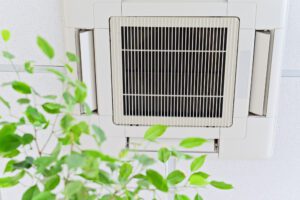Here, we will explore the intricate relationship between HVAC systems and indoor air quality and the importance of maintaining these systems for healthier living and working spaces.
What Impact Do HVAC Systems Have on Indoor Air Quality?
Here are five significant impacts HVAC systems have on your home’s indoor air quality.
-
Filtration and Air Cleaning
One of the primary ways HVAC systems influence indoor air quality is through air filtration. All HVAC systems come equipped with filters, and the efficiency of these filters can vary.
The filters capture particulate matter, such as dust, pollen, pet dander, and other airborne allergens. Higher-quality filters, like High-Efficiency Particulate Air (HEPA) filters, can trap microscopic pollutants and pathogens.
-
Ventilation and Fresh Air Intake
Proper ventilation is essential for maintaining good indoor air quality. HVAC systems are designed to bring fresh outdoor air while simultaneously expelling indoor air.
This exchange of air helps to dilute indoor pollutants and replenish oxygen levels. Mechanical ventilation systems ensure a continuous flow of fresh air while also managing humidity levels, which is particularly important in preventing mold growth and maintaining comfort.

-
Temperature and Humidity Control
HVAC systems are designed to regulate temperature and humidity levels, and these factors directly impact indoor air quality. Maintaining a comfortable temperature and controlling humidity within the recommended range (typically between 30-60%) is essential in preventing mold and mildew growth, which can produce allergens and irritants that affect respiratory health.
-
Preventing the Spread of Airborne Pathogens
In recent times, the role of HVAC systems in preventing the spread of airborne pathogens, such as viruses, has gained significant attention. High-efficiency air filters, UV germicidal irradiation, and air purification systems are some technologies employed to help reduce the transmission of viruses in indoor spaces.
-
Maintenance and Regular Servicing
While HVAC systems have the potential to enhance indoor air quality, it’s important to note that their effectiveness relies on regular maintenance and servicing. Neglected systems can accumulate dust, dirt, and moisture, creating conditions conducive to mold and bacterial growth.
Additionally, worn-out or malfunctioning components can compromise the efficiency of air filtration and ventilation.
To ensure that your HVAC system is promoting healthy indoor air quality, it’s crucial to:
- Change or clean filters regularly.
- Schedule routine professional maintenance to check for system efficiency and cleanliness.
- Monitor and maintain humidity levels.
- Consider upgrading to high-efficiency air filters or air purifiers for added protection against contaminants.
Consult with an Expert for Excellent Indoor Air Quality at Home
By understanding the various ways in which HVAC systems influence air quality and by taking proactive measures to maintain and enhance their performance, we can create indoor environments that are more comfortable, healthier, and conducive to overall well-being. In an era where indoor air quality is increasingly concerning, the role of HVAC systems in providing clean, fresh, and safe air is more important than ever.
A-Tech Appliance Repair has the expertise to ensure your home’s air quality is superb.



